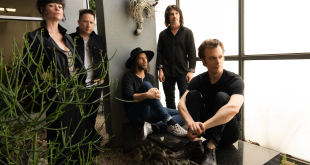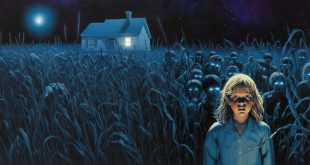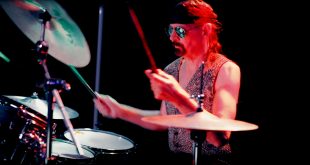From 1986 to 1992, The Cathouse stood in the Los Angeles club scene as a place where anything and everything went down. In the mid 80s, then-club promoter Riki Rachtman (of Headbanger’s Ball fame) and then-roommate, Faster Pussycat frontman Taime Downe, initially created the venue with the simple goal of hanging with bands, obtaining free booze and meeting girls. To say they succeeded at that would be an understatement, as their strict no-camera policy would suggest. Ultimately, however, the club served as a unique melding of the most diverse – and otherwise, starkly contrasting – music and entertainment scenes throughout the United States.
On December 30, 2018, Rachtman launched the Cathouse Hollywood Podcast, featuring never-before-heard, personal insight into the club’s notorious goings-on. The bi-weekly podcast is currently on its ninth episode, called “Then Axl yelled at David Bowie ‘I’m going to kill you, tin man!’” which derives its title from a largely contentious confrontation between Guns N’ Roses frontman Axl Rose and English rock legend David Bowie.
I had the pleasure of speaking with Rachtman about his formative passion for rock music, his open-minded philosophy when it came to the Cathouse’s identity, as well as his success with the podcast.
ME: When was your introduction to rock and roll as a kid?
Riki: Oh jeez — my introduction to rock and roll! My dad used to manage bands, so I’d been around music my whole life. As a kid, I remember listening to music and singing along to songs on records. I dunno, that’s like asking someone about the first time they ate a cookie (laughs)! That’s like asking about the first time they…laughed! But I’ve always loved rock and roll and wanted to work in the rock and roll business. In fact, at that time, I used to make tapes and would talk into the cassette recorder, pretending I was a radio DJ going in and out of songs. That was around 12 years old, so I’ve always been that guy.
ME: Later on, as you were coming up with the Cathouse, did the idea seem wild at first?
Riki: Yeah it was, but a lot of it was based on what went on in Los Angeles at that time. I had no idea that I’d even survive for a year, let alone have one of the most downloaded podcasts talking about it 30 years later (laughs)! It was just something of a cool place for our friends to hang out and was like having a house party where you get free drinks and get to meet a lot of girls. It wasn’t necessarily done with the intention of being a popular or successful club, or getting any press at all — it was just done for fun. And it wasn’t a matter of getting musicians from only one specific scene either, it was more along the lines of “Look at all this music we like, let’s find a way to bring it all together!”
ME: At the beginning of the latest episode, I learned that your best concert you’ve ever attended was Guns N’ Roses, on October 10th, 1989 at the Cathouse, which is where they ended up shooting the video for “It’s So Easy.” But I also learned that the Cathouse had a strict no-camera policy. Was that video an exception to the rule?
Riki: Yeah, it’s so funny (laughs)! Because I thought the Cathouse wasn’t going to become anything, I wanted to create an environment where people were free to do whatever they liked. That’s why I had that policy, and I kind of wish I didn’t, because I’d love to have seen videos and pictures from that time.
What happened with the video was Axl said, “Hey, we wanna shoot a concert here.” Guns N’ Roses had just gotten back from playing stadiums. Not even arenas — stadiums, and they wanted to film a video at the Cathouse. So, he wanted to bring his camera along with a film crew, and Nigel Dick was the director. This is when Guns N’ Roses were one of the biggest bands. There are actually a few videos of the Cathouse that have gone around, but there were only two times that a full-blown crew came in. One time was for The Decline of Western Civilization: The Metal Years and the other was on October 10th, for the filming of the footage which ended up being for the “It’s So Easy” video.
ME: In addition to Guns N’ Roses, another one of your musical heroes was David Bowie. I like how you compare how Bowie fared with Tin Machine to Guns’ mega success with Appetite For Destruction. Even with their scuffle, how did you feel having both of them in your club?
Riki: The biggest problem, which I don’t think I’ve addressed in the podcast, was that when Bowie was there, I don’t even think I got to meet him. I don’t know where I was at that time — maybe just watching Guns N’ Roses. I was actually trying to find out if anyone else had met him that night, too. Apparently, he was in the DJ booth. The thing was, every night, a new celebrity would come to the club. I’m walking by the bar upstairs, and somebody’s like, “Hey, did you see Robert Plant at the bar?” I’m like, “Oh, Robert Plant’s here? Cool!” Or, when Alice Cooper would play — these guys were also my heroes — for whatever reason, I wouldn’t get a chance to see them.
That was probably the only time when David Bowie wasn’t as relevant. Of course, later on, he’d come out with great music again, and before he passed, he was up to that cool factor again. But at that point, it was just like, “Aww man,” ‘cause he was putting out junk, and Tin Machine was just okay, while Guns N’ Roses were one of the biggest bands in the world. I’d never viewed them as being that big; they were just my good friends. Most of the bands of that era had come from the Cathouse at the time, so it was really weird seeing them as big rock stars.
ME: With everything that went down, that moment seemed like a blur almost.
Riki: Most of it is a blur for me (laughs). The thing was I was in charge of the club, so I had to run around and make sure everyone was doing everything correctly, and that everything was in the right place. Unfortunately, that meant spending too much time on those aspects instead of relaxing and enjoying the bands, and taking the experience all in. Yeah, it was pretty overwhelming that all this stuff was happening, and it was going on every single week. I ran the dance club, Bordello, around the same time, and Cher and Michelle Pfieffer would be in that DJ booth. I was like, “Woah, okay, this is kinda crazy — let me make sure my door man’s okay.” I spent too much time making sure things would run smoothly when I should have just relaxed.
ME: On the surface, someone may see the name The Cathouse and jump to the conclusion that it was just a club for metal, but you actually saw an appreciation for musical diversity.
Riki: Absolutely. To me — and I say this in the latest podcast episode — everything is rock and roll. Whether it’s punk rock or country, it’s all rock and roll. I listen to everything. The beauty of it was we were letting all these different bands play. The only prerequisite was that you didn’t suck. I was actually just watching this band on YouTube that has mimes, a sax player, a horn player, and two hip hop guys in the background doing this kind of R&B accompaniment, and Axl’s singing background vocals for them! I’m like, “My God, they just got away with everything there!”
In the same way, as I mentioned earlier, we were so wrapped up in everything in the Cathouse just to have fun, not judge whatever band was playing, or look too highly or down upon anyone else. Everyone just wanted a good time, so it didn’t matter what bands would play. Body Count wasn’t very big when they played there, and I was like, “Wait, Ice-T’s in a metal band?” Then I’m like, “Oh yeah,” and everyone else was like, “Yeah, this is brilliant!” I think we were more accepting, as opposed to keeping everybody locked within their genres.
ME: Yeah, I know what you mean. Guns N’ Roses otherwise had a deep respect for Bowie, and for a time, Axl was an early fan of Nirvana.
Riki: You’re 100 percent right. Before Nirvana broke, Axl was really into them. In fact, we were both listening to them, and we really loved their first album, Bleach. By the time Nirvana did Headbanger’s Ball, I was like, “Ahh man, I gotta get Nirvana to play the Cathouse,” since Alice In Chains were performing there before. Of course, Kurt was so whacked out that that wasn’t even brought up.
ME: When Alice In Chains was coming up in the 80s Cathouse era, what did you think of them?
Riki: With Alice In Chains, people don’t remember that they got pretty popular way before Soundgarden and Nirvana. I thought, and still think, Alice In Chains is just a great rock band. I don’t like the term ‘grunge,’ you know? These are just kickass rock bands.
ME: After all is said and done, I can tell you just love music. That’s what I gathered from seeing you on Headbanger’s Ball, and with this new podcast.
Riki: Well thank you, and I appreciate that. As long as it’s good music, I like it. I even like old school hip hop. I appreciate it even more now, because when I was shown some new stuff, I was like, “Okay, this is just complete crap! I cannot believe how lazy this is; this is horrible; I don’t like it!” But then someone would show me something else and I’d end up liking it! I don’t care if it’s on the top 40 charts or something that only 10 people like. But even if it’s a genre I’m familiar with, that doesn’t necessarily mean I’m going to like it right away. And if somebody plays something away from the genres I usually like, I’ll listen to that, too!
ME: How would you sum up your run of the Cathouse, and what it had become?
Riki: It was such a magical, incredible, beautiful, sexy, dangerous time. It’s still kind of surreal how it looks to other people, too! The success of the podcast is absolutely mind-blowing. I never expected it to do as well as it’s doing. That whole experience back then reassures me that creating the Cathouse was worth it. People just love hearing these stories. I really wish I could go back in time, keep my mouth shut, and really observe what was going on around me. I was so obsessed with work that I missed out on that aspect. And believe me, I had a lot of fun! But it’s amazing that all this stuff is still interesting to people. It’s very, very flattering.
ME: Counting the latest episode, how have people responded to the podcast overall?
Riki: Oh my God! As of right now, seven of the episodes are on iTunes’ top 200, and we’re the number five music podcast. Not just rock — music! I don’t know how the hell that happened (laughs)! I was looking, and I was like, “Hold on a second…K-Pop…and then…Cathouse!?” I don’t have publicists, I don’t have sponsors, I don’t have a network, and to see it go to number five just blows my mind. Everyone’s enjoying it, and they’ve been binge-listening to all the episodes; that’s pretty cool!
ME: Congratulations, man!
Riki: Thank you!
ME: Lastly, anything you’d like to say to your fans?
Riki: Download the Cathouse Hollywood Podcast, and if you like what you hear, go on social media and just tell me! I also have another podcast called 19 Minutes with Riki & Lea, and that’s also a lot of fun. Podcasts are a great thing to do. It could be about music, fishing, noodles — anything! Don’t worry about how many listeners you have. Just do it and keep doing it until you get better, and better, and better! That’s the beauty with this medium. Anybody could have a show, and it’s the easiest way to get involved in this business.
Listen to the Cathouse Hollywood Podcast:
 Music Existence Because of Music, We Exist
Music Existence Because of Music, We Exist



